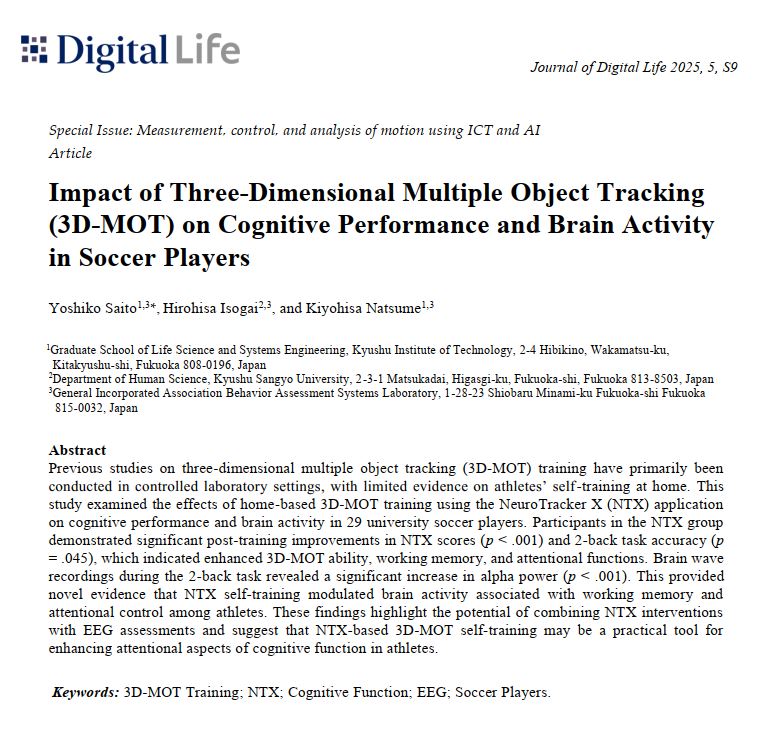Welcome to the Research and Strategy Services at in today's fast-paced.


Exploding neuroscience research and the constant evolution of neurotechnologies are transforming the way clinicians deliver rehabilitation and sports performance training. In this blog, I'll describe how remote training has allowed me to utilize my time more efficiently and to provide more comprehensive services for my clients and patients. I will also use NeuroTracker as a specific example of why combining traditional clinical practices with objective home training is truly a game changer for clinicians.
I have been a full-time PhD clinical researcher for the past 4 years in the department of Kinesiology and Physical Education, at Wilfrid Laurier University in Waterloo, Ontario. My current research is focused on the integration of visual perception (e.g., dynamic visual acuity), balance control, and exertion with adolescents to young adult athletes with and without concussion. I am also a Registered Physiotherapist, Certified Athletic Therapist and founder of Thrive Neurosport Rehabilitation and Performance. My passion for neuroscience and sports medicine has led me to connect these concepts utilizing the latest research and neurotechnologies in my clinical practice and for educating other clinicians.
At Thrive Neurosport I provide services in two main areas.
• Physiotherapy - In-person and telehealth physiotherapy and concussion management
• NeuroSport Performance - Clinical assessment & training using objective technology
I work with active individuals and athletes of all levels, connecting how the brain and body work together to level-up performance in sport and life through,
• Education and empowerment
• Exercise prescription and programming (strength, mobility, balance, vestibular, etc.)
• Sensorimotor integration and training
• Other care interventions including manual therapy, dry needling and acupuncture
Within my clinical space, I have access to a fully functional gym and a comprehensive range of assessment and training resources, so I can provide more rigorous interventions for athletes than a traditional physiotherapy clinic. Particularly for concussion recovery, I can integrate clinical domains such as exertion, sensorimotor function, and cognition to help determine return to sport readiness or to measure readiness for day-to-day life activities.
In addition to my clinical practice, I also lead a clinical education platform for healthcare and movement professionals called, Clinical NeuroSport Education (CNS-Ed). My hope is to connect the concepts that I have learned through years of research and practice to enhance current approaches to recovery and performance training. Since I have a limited capacity to spend time in both the lab and my clinic, I have sought out modern approaches to optimize my resources to provide for patients and clients. Particularly with the current restrictions of the COVID-19 pandemic, this has become a much bigger priority for myself and many others.
Until 2020 I conducted all of my work in person, which was always challenging with time constraints. However, in the past year I’ve adopted what I call a “hybrid model” of care. This involves incorporating remote telehealth assessments and more robust training interventions that clients do at home. It includes offering or prescribing home exercise packages for athletes that include cognitive training online via remote software platforms and other individualized drills.
This model has worked incredibly well for creating greater accessibility to a wide range of clients and patients, as well as optimizing the time spent training when it works best for them. Whereas prior to this approach, training could only be conducted in-clinic, and so I had a limited capacity when I could see patients and clients. A key benefit is that now I can prioritize that time to provide more robust assessments. This model has led to greater adherence to programming and overall improvements in key aspects of training.
The new NeuroTrackerX platform is a role model neurotechnology that fits perfectly with my Neurosport perspective for remote training. For example, I can use it in-clinic or online to do an initial baseline assessment, then create a custom program tailored to the individual’s needs that they perform at home. I can also monitor their performance and give remote feedback, maintaining open communication in-between clinic visits.
Here are 6 specific reasons why NeuroTrackerX works so well with the hybrid model.
If you are new to NeuroTracker, here's an introductory demo video for the core task.
Implementing tools like NeuroTrackerX as a remote training solution has not only transformed the quality of service I can offer, but also the number of clients I can serve. Naturally, this is helpful for the bottom line of a small business. With the many facets of my professional career, I must consider the efficiency of having augmented revenue coming in without significantly increasing my time commitment.
In addition, I can also serve patients with concussion further into full recovery and keep relationships with performance-focused athletes longer, because the benefits are on-going. Most importantly, I can provide a better standard of overall service providing an objective, research-informed approach to my practice.
From the client’s perspective they feel empowered because they can see their progress and have the freedom to access their personal training every day, compared to being limited to just once or twice a week.
Since transitioning to a hybrid model and implementing regular NeuroTracker training, clinical outcomes have been superb. For example, from an injury prevention perspective, athletes may attend to more information within their field of play and develop the ability to make successful quick decisions. In dynamic contact sports environments, this may help improve their ability to widen their perspective, react effectively, and potentially avoid taking a hit that they wouldn’t normally see coming.
The increased accessibility and frequency of training also means that I can track perceptual-cognitive recovery and return-to-play readiness more accurately with greater data points. Overall, this approach is taking rehab and performance to another level with greater transfer to real-life and sports environments.
I think integrating a hybrid model of online and in-person services is the future of rehab and performance. This approach will be paramount in athletic performance moving forward. Obviously with the COVID-19 pandemic lockdowns, telehealth has proven to be invaluable when clients can’t physically come to the clinic, as well as just for keeping game-ready when normal training is compromised.
The fact that objective tools like NeuroTrackerX can allow me to not only track, but also interact with the client through the software, adds an additional level of service and care. I can prompt clients to train if needed, although compliance with athletes and patients to date has been excellent. The main takeaway is that I can regularly touch base with patients near or far without seeing them in person, while providing a research-informed training intervention.
With my passion for connecting neuroscience and sports medicine, I’m excited for continued development is this field. The fact is this new technology is just opening doors to access a whole other side of training and rehab. It's so accessible for everyone that it will be pivotal in my approach to rehabilitation and performance moving forward.







Welcome to the Research and Strategy Services at in today's fast-paced.

Learn about Marc Van Loken's growing mission for brain health advocacy with Marvalous Health.

Understand the unique challenges of gifted ADHD kids and strategies to help them find balance.

Learn about two pioneering centers led by Dr. Kakavas that integrate neuroscience, biomechanics, and elite rehabilitation methods.
.png)